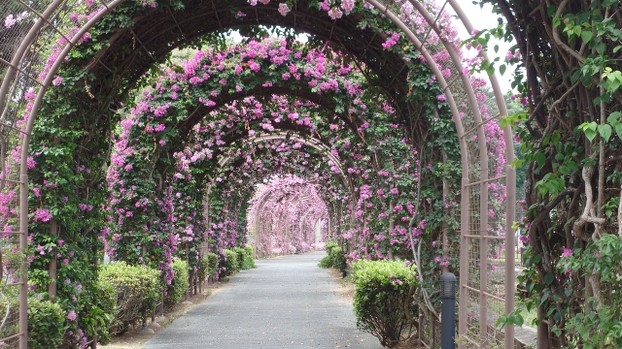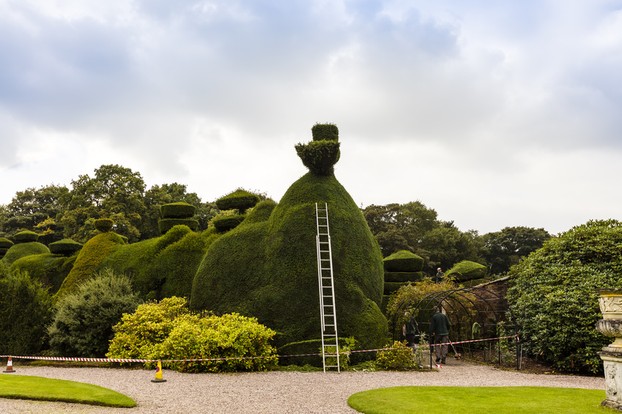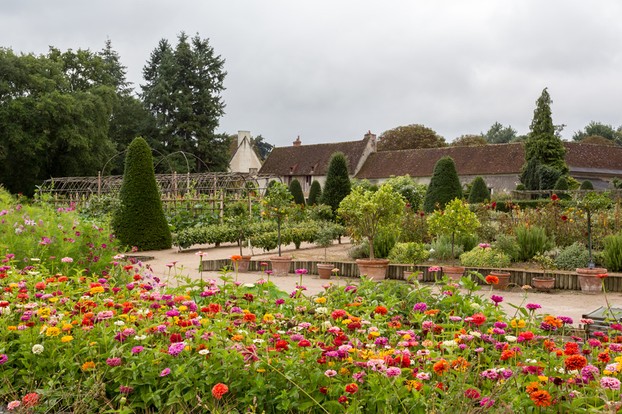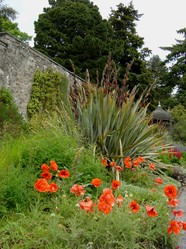Eden was supposed to have been a perfect garden, the archetype of all gardens, but not so. There was one pest that was not eliminated and which brought down the whole enterprise. But is there any perfect garden, for even if you can look at your garden and say "It is perfect" [which none of us can] your experience is only a brief snapshot in the flow of time?The seasons roll on and the garden changes, and this is the key point, a garden is not a short term task and even the best gardens will, if neglected, turn quickly to weeds. I have seen a few sad cases,one only recently,when an expert gardener was taken seriously ill and been unable to tend his plot. It is heart-breaking to see the speedy decay of the garden as its gardener contracted cancer.
So the most important element in having a nice garden is the time that you commit to it. The commitment of time to a garden is of critical importance. It is no use doing the work in a mad burst of energy for a short time, for then the weeds will be defeated for a while, but when you relax they will return. You need to commit to regular work during the week, and moreover, on allotments we find that the best gardeners do not confine their work to the Spring and Summer, but they continue throughout the winter season, doing what is necessary to prepare for the coming year.
I have thought for some time that a balanced energy expenditure is necessary, and this is where I tend to fall down a little. I have a tendency to attack jobs at maximum pace, going hammer and tongs at them, as the saying goes. But that can mean that you tire quicker. Find a steady pace at which you can cope and stick to it. An error that has blighted the English speaking world is the Puritan tradition that regarded rests as time-wasting. They are not, and it is wise to build in some rest time into your activity schedule. Finding time to sit a while will make you all the more productive.
Sustaining motivation is important, for I have known several gardeners who have become disillusioned and given up.One way to sustain motivation is to find time to simply look and enjoy. Lean on your spade, survey your domain and simply be happy. Also it is useful to enjoy the work. Sometimes when we work we become so completely focused on future goals that we forget to enjoy the present, so the joy goes from our work. Thus work becomes a chore and we become disillusioned, but if we find contentment in the actions that we do rather than just in the goals to which they aspire and relish the moment we can sustain our motivation indefinitely.
Welcome help from family and friends. There are some antisocial gardeners, but extra help has a double advantage. Firstly it means that more human hours are put into the garden than one gardener alone can give; secondly it makes the gardening into a social, maybe family experience, which can sustain and intensify motivation. I invite my family to help with the allotment. My eldest son and his wife do, and my second son's wife is now keen on a role. This pleases me.










 Pilgrimage. A review20 days ago
Pilgrimage. A review20 days ago
 Leo the Fourteenthon 05/09/2025
Leo the Fourteenthon 05/09/2025
 The Melsonby Hoardon 03/25/2025
The Melsonby Hoardon 03/25/2025



Comments
I do not know of any such traditions. Sorry.
The Indian subcontinent archives in its Buddhist and Hindu mythologies gardens of their gods. Those mythologies avail us of actual plant names.
Is there such a tradition somewhere regarding plants invoking the perfect, Eden garden?
Derdriu, I appreciate beauty very greatly, but my ability to draw a beautiful picture is very limited, but my artistry is with words. I have worked on my drawing and made some progress,but what I produce is not great.
frankbeswick, Thank you for the photos, practicalities and products.
Your product lines are wonderfully helpful: I know this because I already have both books on English gardens.
The photo of the topiary gave me quite a laugh, because of the ladder leaning against (what must be a foliage-covered sturdy branch) the (what kind?) tree.
You mention that you're strong in soil and weak in artistry. This surprises me what with your appreciation of all things aesthetic in nature. What kind of artistry would you be referring to: contrast and uniformity of colors, shapes and textures? placement?
I am glad that you like the article. Your approval means much to me.
So true! I love the photos you chose to illustrate this article. And the reminder that it takes time, planning, effort and patience to have a wonderful garden.
Iam pleased that you enjoy descriptions of gardens.
C Money
Spot on. I love walking in a garden. It is total relaxation.
@Veronica – Thanks.
@frankbeswick – I constantly receive eMails about new Wizzle pages but thanks be to God I actually have several work-at-home projects that are keeping me busy and generating income. Saw your Wizzle about the garden first thing this morning when I signed into my eMail and had to take a few minutes to pop in. I am not a gardener but I do find a lovely garden to be an irresistible place of comfort. I don't even have to physically visit the place. People could just describe the garden in words and I'm there!
Correct. As we saw with the potager in the picture.